
DALLAS — The novel selective mineralocorticoid receptor antagonist finerenone appears to protect at-risk patients from cardiovascular events when compared with placebo, researchers reported at the American Heart Association’s virtual Scientific Sessions 2020.
Treatment with finerenone was associated with an 18% reduction in the composite primary endpoint of kidney failure, sustained 40% of greater reduction in glomerular filtration rate from baseline, or kidney death, when compared to patients on placebo (HR 0.82 [95% CI 0.73-0.930], P=0.0014), said Gerasimos Filippatos, MD, professor of cardiology at University of Athens Hospital Attikon, in a press briefing.
A key secondary endpoint — the composite of cardiovascular death, non-fatal myocardial infarction, non-fatal stroke, or hospitalization for heart failure — also favored treatment with finerenone. Filippatos said that landmark was reduced by 14% (HR 0.86 [95% CI 0.75-0.99], P=0.034).
“Treatment with finerenone significantly lowered the overall risk of cardiovascular events compared with placebo,” he said in presenting the preliminary data from FIDELIO-DKD (Finerenone and Cardiovascular Outcomes in Patients with Chronic Kidney Disease and Type 2 Diabetes).
Specifically, he said there was a 15% reduction in the risk of cardiovascular events among the patients who did not have cardiovascular disease and a 14% reduction among those patients in the study who did have a history of cardiovascular disease.
“We are pleased to see that finerenone could provide a meaningful treatment option for patients who are battling chronic conditions,” Filippatos said. “Patients with chronic kidney disease and type 2 diabetes are not only at high risk of progression to kidney failure, they are also exposed to a higher risk of cardiovascular events – and face increased cardiovascular morbidity and mortality.
“These new findings for the investigational drug finerenone suggest the potential to reduce the risk of cardiovascular events in patients with chronic kidney disease and type 2 diabetes, with and without a history of cardiovascular disease,” he said.
In drilling down into the cardiovascular endpoint, the researchers reported treatment with finerenone trended to show a reduction in cardiovascular death, in hospitalization for heart failure, and in myocardial infarction. There was no difference between the groups in the prevention of stroke, he reported.
FIDELIO-DKD study is a phase III, randomized, double-blind, placebo-controlled trial that enrolled nearly 6,000 patients at more than 900 sites in 48 countries. The average age of the participants was 66; and 70.2% of the participants were men.
After follow-up of more than 2 1/2 years, researchers found a daily, oral treatment at 10 mg or 20 mg with finerenone reduced by 14% the risk of cardiovascular events for patients who already had a history of heart disease and for those who had no previous history.
Filippatos reported that treatment with finerenone was associated with manageable increases in potassium blood levels. About 2.3% of patients discontinued due to hyperkalemia compared with 0.9% of the patients on placebo.
In commenting on the trial results, designated discussant Christoph Wanner, MD, professor of medicine and chief of nephrology at the University Hospital of Würzburg, Germany, described the findings in FIDELO as “robust, as shown by the tight confidence interval figures.”
“The new interventions for kidney patients — SGLT2-inhibitors and finerenone — are shifting the focus away from glucose management towards organ protection,” Wanner said. “Finerenone is both a cardiovascular and kidney protective medication in individuals with type 2 diabetes and is an option where SGLT2-inhibitors are not preferred.”
The research was published online in the journal Circulation at the time of the presentation at the scientific sessions.
The phase III program with finerenone in chronic kidney disease and type 2 diabetes enrolled over 13,000 patients across a broad range of disease severity including those with early kidney damage and more advanced stages of kidney disease. It is the largest phase III clinical trial program to date in chronic kidney disease and type 2 diabetes and comprises two studies, FIDELIO-DKD and FIGARO-DKD, which are evaluating the effect of finerenone versus placebo on top of standard of care on both renal and cardiovascular outcomes.
Samuel Kailes, Contributing Writer, BreakingMED™
FIDELIO-DKD was funded by Bayer AG. Several co-authors are company employees.
Filippatos disclosed relationships with Boehringer-Ingelheim, Vifor, Bayer, Novartis, Medtronic, Servier, and Amgen.
Wanner disclosed relationships with AstraZeneca, Bayer, Boehringer-Ingelheim, FMC, Gilead, GlaxoSmithKline, Lilly, and MSD.
Cat ID: 231
Topic ID: 98,231,728,791,730,232,446,914,12,13,127,411,231

